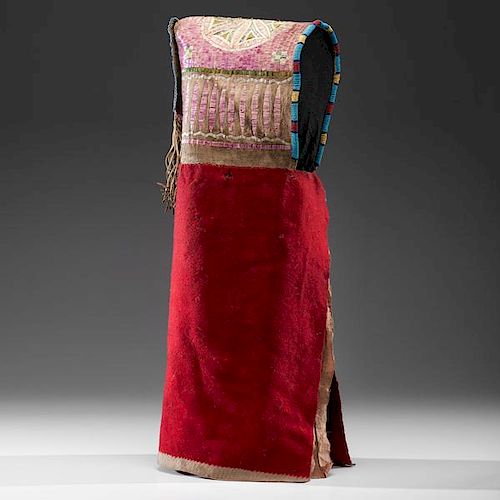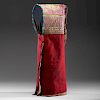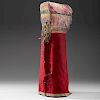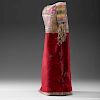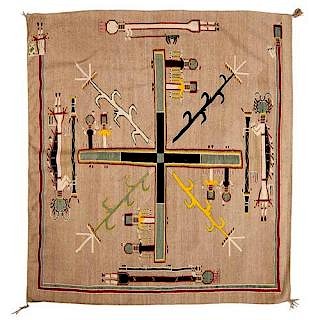Sioux Beaded and Quilled Hide Cradle Collected by Medal of Honor Recipient James M. Burns
About Seller
6270 Este Ave.
Cincinnati , OH 45232
United States
With offices in Cincinnati, Cleveland and Denver, Cowan’s holds over 40 auctions each year, with annual sales exceeding $16M. We reach buyers around the globe, and take pride in our reputation for integrity, customer service and great results. A full-service house, Cowan’s Auctions specializes in Am...Read more
Two ways to bid:
- Leave a max absentee bid and the platform will bid on your behalf up to your maximum bid during the live auction.
- Bid live during the auction and your bids will be submitted real-time to the auctioneer.
Bid Increments
| Price | Bid Increment |
|---|---|
| $0 | $25 |
| $500 | $50 |
| $1,000 | $100 |
| $2,000 | $250 |
| $5,000 | $500 |
| $10,000 | $1,000 |
| $20,000 | $2,500 |
| $50,000 | $5,000 |
| $100,000 | $10,000 |
About Auction
Sep 25, 2015 - Sep 26, 2015
Cowan's Auctions dawnie@cowans.com
- Lot Description
Sioux Beaded and Quilled Hide Cradle Collected by Medal of Honor Recipient James M. Burns
thread and sinew-sewn, with cradle hood formed of thick, softly tanned hide and quilled with purple, yellow, green, and blue; roundel at crown is flanked by undulating lines and elongated oval elements; edge of hood wrapped with greasy yellow, light blue, dark blue, and red white-heart glass beads; wide, quilled, hide tab hangs from back of hood and is finished with fringe. Interior of hood and body lined with patterned cotton; exterior made of red wool stroud, length 38 in. x width of hood 11.5 in.
fourth quarter 19th century
James Madison Burns was born in Jefferson County, Ohio in 1845. In 1861, at the age of 16, Burns enlisted in the West Virginia Infantry. On May 15, 1864, at the Battle of New Market, Virginia while under a heavy fire of musketry from the enemy he voluntarily assisted a wounded comrade from the field of battle, thereby saving him from capture by the enemy (Heitman 1988:265). This act of valor earned Burns the Congressional Medal of Honor.
According to census records, in 1870, Burns was located in the Fort Sully vicinity, Dakota Territory, and had been promoted to Second Lieutenant in the 17th US Infantry. The 17th US Infantry was mustered to Fort Abraham Lincoln, D.T. alongside companies from the 6th US Infantry and the 7th US Cavalry. In 1876, when General George Custer rode to Little Big Horn, Burns remained at the Fort as acting commanding officer.
Two days after the battle, Captain Miles Keogh’s horse, Comanche, the sole US survivor of the battle, was found wounded. Burns assisted the fort’s veterinarian, Dr. Charles A. Stein in removing the bullets. Dr. Stein [spoke] favorably of the assistance he received, in extracting the bullets, from Lt. [James M.] Burns (Gray 1977). It is possible that during his time in the Dakota Territory, Burns acquired the cradle.
Burns returned to Lebanon, Ohio and wed Caroline Corwin Sage in 1883. He remained in the military until he retired in 1899. He died in 1910 and is buried in the Lebanon Cemetery, Lebanon, Ohio.
Heitman, Francis B. Historical Register and Dictionary of the U.S. Army. Volume 1. Washington, G.P.O., 1988.
Gray, John S. “Veterinary Service on Custer’s Last Campaign.” Kansas History: A Journal of the Central Plains. Autumn 1977 (Vol. 43. No. 3). pp 249-263. (Accessed 24 August 2015 at https://www.kshs.org/p/veterinary-service-on-custer-s-last-campaign/13275)
Provenance: Deaccessioned from the Warren County Historical Society; Collected by James M. Burns (1845-1910)Condition requests can be obtained via email (danica@cowans.com) or by telephone (513-871-1670). Any condition statement given, as a courtesy to a client, is only an opinion and should not be treated as a statement of fact. Cowan's Auctions shall have no responsibility for any error or omission.Condition
- Shipping Info
-
SHIPPING. At the request of the buyer, Cowan's will authorize the shipment of purchased items. Shipments usually occur within two weeks after payment has been received. Shipment is generally made via UPS Ground service. Unless buyer gives special instructions, the shipping method shall be at the sole discretion of Cowan's Auctions, Inc.. Cowan's is in no way responsible for the acts or omissions of independent handlers, packers or shippers of purchased items or for any loss, damage or delay from the packing or shipping of any property.
-
- Buyer's Premium



 EUR
EUR CAD
CAD AUD
AUD GBP
GBP MXN
MXN HKD
HKD CNY
CNY MYR
MYR SEK
SEK SGD
SGD CHF
CHF THB
THB